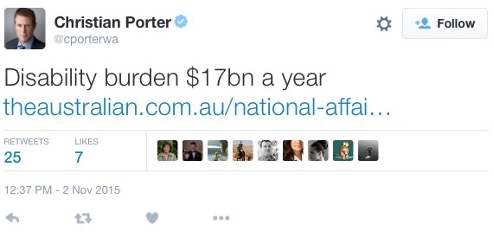In the early part of the twentieth century, Francis Galton (a cousin of Charles Darwin) used the latter’s work to argue that human breeding stock could be similarly improved. He would weed out the weakest and the less able and produce a sturdier race. He named this brave new science, eugenics. Others, most notoriously the Nazis, but also governments in Britain and North America, took these ideas and ran with them. Until recently, the crematoria of Hitler’s death camps were enough to remind most that this was not an idea consonant with actual human flourishing.
Until recently. It is true that people with disabilities have always had an uphill struggle justifying our existence (see, for example, this post from the (since deleted) account of the then social welfare minister in 2015, describing the ‘disability burden’):

The pandemic, however, has turned the disability community’s fears of increased discrimination into daily reality. While the pre-vaccine phase of lockdowns was accompanied by ableism and eugenics rhetoric (as I mentioned in my previous column on ableism and pandemic), the situation has only become worse.
The decision seems to have been made by Federal and State governments (WA honourably excepted) that vaccines will be the principal line of defence against the virus. That, in itself, would be an inherently eugenicist approach (given that not only are vaccines not available for all of the population) but also that there are very few alternatives available for those at risk. Testing and even boosters are hard to come by and even the pretence that First Nations, elderly and disabled people enjoyed ‘priority’ (which was maintained for the original vaccines) has now been dropped when it comes to the required boosters. The failures to vaccinate people in group homes and sheltered workshops — and the accompanying toll in infections — gave real, if underreported, testimony as to how little disabled lives were valued.
"Many of these conditions on Dr Chant’s list are hardly rare — 1 in 5 Australians have diabetes and 2 in 3 are overweight or obese."
Increasingly, however, the quiet bit is being said out loud. ‘Underlying conditions’ is daily being used as a rhetorical device at government press conferences to minimise the harm done by the ‘Let it Rip’ approach. Covid-19 has now killed 3144 people (as at 24 January 2022). Since 1 January, when the ‘milder’ Omicron variant has been dominant, 903 people have died.
We have, however, been instructed not to grieve and to throw wide the doors to schools and businesses — even as hospitals are closing theirs, declaring ‘Code Brown’ as their capacity bursts. These deaths should be accepted as capitalism’s collateral since they are predominantly among those with an ‘underlying condition’ (who, presumably had it coming). The fittest will, after all, survive.
What then counts as an ‘underlying condition’? Well, as the NSW Chief Health Officer tells us, being over 65, having heart conditions, obese, asthmatic, immunocompromised, ‘a significant mental health illness’, a neurological disorder, autoimmune diseases, liver diseases, diabetes, cancer, being on a palliative care ‘pathway’ are all included. No mention need be made of who these people were, what their dreams or aspirations might have been or how they had survived until Covid came along.
In the old days, of course, a person with a mental illness who was hit by a bus was regarded as dying of bus rather than anything else. As social media user Peter Russell put it: ‘…waiting for the government to report details of a plane crash where 80 died, 50 of who had underlying health conditions, 26 had no insurance & 2 had pilot licences.’
Now, it might be that underlying conditions could be relevant to therapeutic interventions for a person presenting with COVID. In that case, though, it is presumably a matter between the treating physician and the patient and not something relevant to a news conference. Again, if a condition which increased the risk of COVID were lifestyle related, there might be a case for encouraging behaviours to avoid it. However, that is not what has happened in practice: as noted above, disabled people have been actively deprioritised in the governments’ COVID response. No, underlying conditions are reserved for announcements of deaths only.
People in the disability community have often had a hard time persuading folk who do not see themselves as such that ableism is a problem. Chronic pain, inaccessible text or catheterisation is not everyone’s experience — and so many can go through the world unaware of the issues which these things raise for accessibility in a world which is not designed to accommodate people who experience them.
The ‘underlying conditions as eugenics’ form of ableism — discounting the deaths of ‘lives unworthy of life’, as the Nazis so charmlessly put it — is not so easily dismissed. Many of these conditions on Dr Chant’s list are hardly rare — 1 in 5 Australians have diabetes and 2 in 3 are overweight or obese. The condition of being over 65 is likely to affect most Australians if they are lucky — to say nothing of being a child under 5 who still has no access to a vaccine of any kind.
Once again, disability is about ‘us’ not ‘them’.
 Fr Justin Glyn SJ has a licentiate in canon law from St Paul University in Ottawa. Before entering the Society he practised law in South Africa and New Zealand and has a PhD in administrative and international law.
Fr Justin Glyn SJ has a licentiate in canon law from St Paul University in Ottawa. Before entering the Society he practised law in South Africa and New Zealand and has a PhD in administrative and international law.
Main image: Frontline healthcare workers at St Vincent's Hospital adapt to life between the red and green zones. (Lisa Maree Williams / Getty Images)